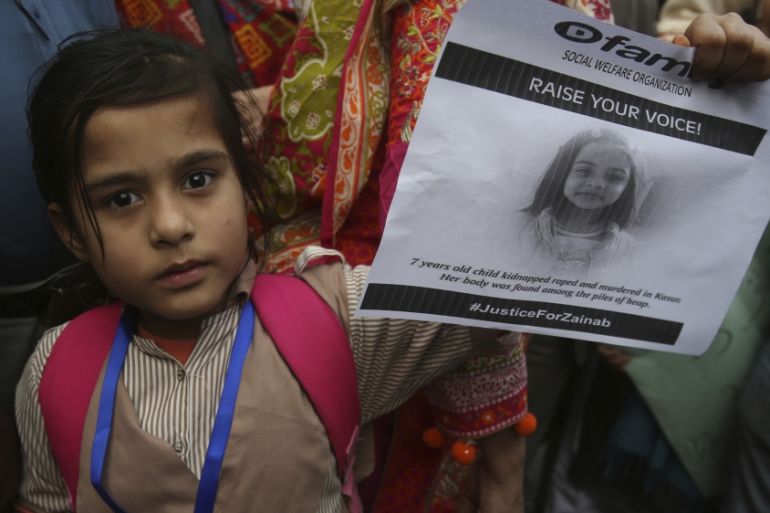Pakistani activist on why rape victim-blaming must end
Al Jazeera speaks to Pakistani activist Fouzia Saeed in wake of rape and murder case of girl, 7, that shocked Pakistan.

The rape and murder of a seven-year old girl named Zainab last week in the Pakistani city of Kasur prompted thousands to stage rallies to demand justice.
The anger and grief over the young girl’s fate was evident both on the streets and on social media, where large numbers used the #JusticeForZainab hashtag to call for action over what they said was not an isolated case.
Keep reading
list of 4 itemsTwo Mexican mayoral contenders found dead on same day
Ecuador weighs security, international arbitration in latest referendum
Man detained in France after bomb threat at Iran consulate
In 2017, at least 12 similar incidents were reported in Kasur district alone, local media reported.
In the first half of last year, more than 1,750 cases of child abuse were reported across Pakistan according to the the non-profit Sahil child protection group. Of them, 65 percent occurred in Punjab province, where Kasur is located.
To understand the situation better, Al Jazeera spoke to Fouzia Saeed, a prominent Pakistani civil society activist who has worked for decades to end violence against women, prostitution, sexual harassment and rape in the country. In 1991, Saeed founded the first women’s crisis centre in Pakistan.
The interview below has been edited for clarity and brevity.
Al Jazeera: What do you think of Zainab’s case? Have you dealt with something like this before on a one-on-one basis?
Fouzia Saeed: I have been in so much pain about this whole issue for so long, because my pain does not depend on one incident. I have dealt with hundreds of cases like this and what disgusts me is the fact that how people in this society look to blame the victim and the family. I’ve heard people asking questions like, “Where were her (Zainab’s) parents? Why were they not careful?”
How hard is it to ask [instead], “Why did the rapist commit that crime? Why did he kill a seven-year-old girl?” Is it difficult to say that a man should not rape a little girl? People need to say it is a crime and not look for causes.
When talking about Zainab, people are saying her honour was taken away and not that she was raped and that that is a crime. Every crime against a woman in our society is deeply rooted in patriarchy, sadly – it is not rooted in circumstance.
In our country, people start their sentence with not believing the victim. They say, “Why was she wearing revealing clothes?” They also question the woman and say, “This is what happens when women go out with their heads not covered”. That is the line of their thinking.
Al Jazeera: How can this mindset change?
Saeed: A society creates myths that gives more power to the man. Some of these common myths say that if a woman is beaten up by her husband, she must have been the one who has the habit of talking back. This is called justifying violence.
In rape cases, most women in our society want to hide that they have been raped because the myth says if you are a chaste woman, you won’t get raped.
We have to change the mindset by breaking the myths long-established myths. Year after year, every mother in this society lies to their daughter by repeating these myths. The first and foremost myth we need to break is that when you hear about rape, you are not going to blame the victim and you are not going find the reason as to why she was raped.
The second step is to shift the spotlight to the rapist than the victim and start asking questions like, “Why did he rape? What punishment will he get for it?” All the questions should be about the rapist.
Al Jazeera: It seems like more people are reacting and seeking justice to cases like Zainab’s than before, especially in the poorer areas. Why do you think this is happening now?
Saeed: Let me take a step back and provide context to this. Yes, awareness has been raised and the civil society gets a lot of credit as they have worked hard for this.
The problem now lies in the fact that with that awareness, there should also be a parallel advancement in other areas, like law and order … for change to take place – just making the woman and children aware is not enough.
Al Jazeera: How has the role of religion been used, or abused, in this?
Saeed: Religion is used a lot when it comes to women. Nobody will say, “The rapist was Muslim, why did he do that?” But if a woman did not cover herself, she will be told that she is not religious enough.
People have abused religion a lot and this needs to be talked about.
Al Jazeera: Do you think the society, law and mindset will ever change?
Saeed: I absolutely believe that society will change – in fact, I think it is already changing.
We will one day be more powerful and women will be more persistent in seeking justice because they need to know that if if we take ourselves for granted, others will too.
It is a war, not a battle. We need to know our body, we need to become OK start living like regular human beings who have rights and a say in everything.
Most importantly, women should start giving information to their daughters and not go “hush hush” about it. It is about time now.